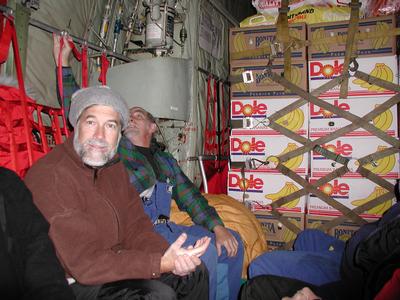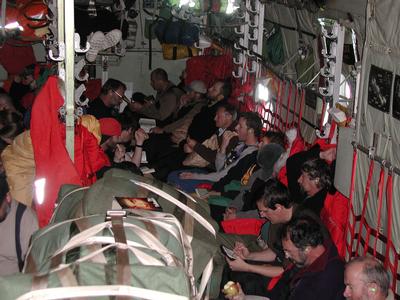18 November, 2001
Heading toward the airport this morning, the rising sun revealed a beautiful clear sky in Christchurch. The sign of good weather lifted everyone's spirits. One of the passengers in the shuttle remarked, "Maybe today we will make it to the ice."
Twenty minutes later, we arrived at the Clothing Distribution Center (CDC) to change into our Extreme Cold Weather (ECW) gear. We were given fifteen minutes to do so, and pack our bags as well. The next step is weigh-ins. Many sports require a person to strip down so their weight can be determined, such as wrestling, judo, boxing, etc. However, a very different type of weigh-in occurs before boarding a flight to Antarctica. After handing my boarding pass to a uniformed member of the New Zealand Air Force, I had to step onto a big scale, wearing all the clothing that will protect me from the harsh environment found in Antarctica.
After my weight was obtained, I had to place my bags on the scale. Each person is given a baggage allowance of 75 pounds. If you go over the allowance, then you must immediately sacrifice items until you make the mark. You are allowed one carry-on bag, the rest of your luggage is placed on huge pallets and bundled together with everyone elses gear. This gear will not be seen again until the plane arrives in McMurdo.
Once everyone had completed check-in, we were given leave for one hour, just enough time to head over to the International Antarctic Center for breakfast. After breakfast, everyone covered in various pieces of their polar gear, waddled back over to the Antarctic Passanger Terminal, to begin the boarding procedure.
First, we had to watch a safely video about Antarctica. Next, we boarded a bus to the airfield, where we found out what type of plane we would be taking to the ice. Our flight would be operated by the New Zealand Air Force. This was a relief to many, becuase the Kiwi planes do not have skis on them. Ski-equipped planes, such as those used by the United States, increase the planes drag thereby increasing flight time. The Kiwi pilot informed us that our flight to McMurdo would take just over 7.5 hours.
Boarding the LC-130 was little humorous. Since space is precious, cargo is packed in especially tight...including people. Encumbered by the Extreme Cold Weather (ECW) gear and heavy carry-on bags, it took quite some time to get everyone stuffed into the plane. When it was all said and done, we were sitting side-by-side and knee-to-knee. Since I was aware of tight conditions found on these flights, I made sure to line up next to small people. The last thing I wanted was to be sandwiched between two or three jolly-green giants.
With the start of the deafening engines, everyone put ear plug-in and buckled up their seat harnesses. A short time later, we were at cruising altitude and the pilot informed us we were free to make ourselves comfortable. This announcement started an orderly dash to claim space.
Some people squeezed atop the cargo pallets to catch some sleep. Others, slithered between the pallets of fresh vegetables and fruits, to claim a space that had the lingering scent of bananas. I headed straight for the back of the plane, where the cargo door was located. Although it was not heated, it was spacious, which allowed me to stretch out and begin reading to pass the time. Reading or sleeping was about the only option. The noise generated by the four propellers of the plane made any form of communication all but impossible.
Every hour I went to one of the few windows located on the plane to gaze upon the Antarctic Ocean we were flying over on our way to McMurdo. I was anxious to spot my first iceburgs, which would indicate we were adjacent to the frozen seas that surround the continent.
When I looked out of the window after our third hour out, I saw nothing but blue ocean, with the white caps of the churning waters dancing below. A short time later, the pilot turned on the address system. Very briefly he stated, "It appears as though the weather has turned for the worse, we have to turn around and return to Christchurch."
The people that I could see, all had the same expression on their face. It was one of disappointment, yet understanding. This is all part of the Antarctic experience. When a flight departs from Christchurch to McMurdo, there is always the chance of it having to return mid-flight...something called boomeranging. We were under the impression that our flight was boomeranged due to foul weather, but it was later disclosed that it was due to mechanical problems.
The flight tomorrow has already been cancelled. This makes spending additional time in Christchurch challenging, for everything except for my carry-on is in the cargo hold of the plane. When I walked back into my hotel, the receptionist said, "I know you are disappointed to hear this Mr. Petula, but welcome back."
(Since the equipment that allows me to transfer pictures from my camera to the Internet is with my checked luggage, I will not be able to post pictures until I arrive in McMurdo.)

Astronomer from the University of Chicago on a Kiwi Hercules.

Returning back to Christchurch due to a damaged propeller.
Contact the TEA in the field at
.
If you cannot connect through your browser, copy the
TEA's e-mail address in the "To:" line of
your favorite e-mail package.
|
